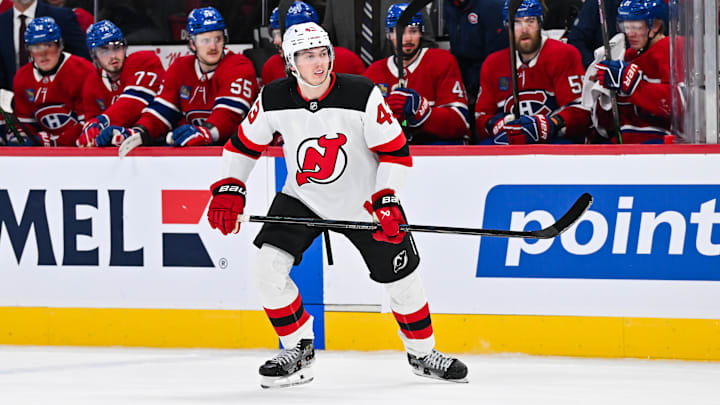The New Jersey Devils are preparing for an important offseason. They made the Stanley Cup Playoffs this past season, but going five games in the first round is clearly not good enough for anyone. They want more, and Tom Fitzgerald has said as much.
Injuries piled up in the playoffs, and that was a big reason why they ended their season prematurely. Luke Hughes was one of the most important injuries, and his might have the longest impact. Hughes to this day still has his shoulder in sling, something his brother Jack Hughes is already out of. Hughes, of course, started last season in a sling and missed the first month of the season. Bookending his season with shoulder injuries is not ideal.
Despite the injuries, the most important part of his offseason is his contract situation. He is a restricted free agent for the first time in his career. Luckily for the Devils, he's not eligible for an offer sheet, so the Devils are in complete control of the negotiating process. However, a new report shows they are willing to give up some of that power to gain a little cap space now.
A bridge deal is a popular negotiation tactic when a GM is not sure of a player's future value. Sometimes, it works out really well. It can reset a player's value. Cody Glass signed a bridge deal with the Nashville Predators, and now he's probably not even worth the $2.5 million he was originally paid in the deal. Now, the Devils can reset instead of being stuck with another four or five years of an overpay. Same thing goes for Trevor Zegras in Anaheim. The Ducks signed him to a three-year deal after back-to-back 23-goal seasons as a very young player. It looked like a risk at the time, but it's been a smart move now that the Ducks can re-address it or trade him for higher value than if he had a six or seven-year deal.
However, Luke Hughes is a completely different situation. For one, his brother is here. Jack Hughes has five years left on his contract. Many believe their brother Quinn Hughes will make a beeline for New Jersey once his contract ends in two years. The Vancouver Canucks team president even acknowledges that possibility.
Daily Faceoff reports that the Devils are open to the possibility of a bridge deal. They shouldn't be. It's a disaster waiting to happen.
Signing Luke Hughes to an eight-year deal now solves so many problems for them long term. It gives Jack Hughes the ultimate incentive to re-sign with the Devils no matter what the team's situation is. Quinn Hughes would know this is the one chance he would have to play with his two brothers in his prime. It all but guarantees they play together in New Jersey. If Luke Hughes signs for, say, three years, then Quinn might sign in Detroit and wait for his brothers to join him in their home state.
The New Jersey Devils absolutely should not sign Luke Hughes to a bridge deal this offseason
On top of the factor of his brothers, there are the traditional risks with a bridge deal. Let's say an eight-year deal would cost the Devils a little more than the Minnesota Wild paid Brock Faber (8x$8.5 million). So, instead of a eight-year deal for $9 million, the Devils could get him to sign for a three-year deal for $6 million.
While that $3 million savings will be important when the Devils only have $12 million to spend this offseason, the Devils have more than $31 million in cap space next season. Signing Luke Hughes to save money for literally one offseason is such a shortsighted move.
If Luke Hughes grows like we expect him to, $9 million is going to be a bargain. Three years from now, Luke Hughes will be 24 years old. If he gets top-of-the-market money, that would be between 11% and 13% of the salary cap. The cap is expected to grow over $113 million in 2027. We don't have predictions for 2028, but even in 2027, 13% of the salary cap would be close to $15 million.
We saw salaries in the NFL, MLB, and NBA absolutely explode since the pandemic. The NHL has seen a rise, but it's only at the tippy top of the salaries, and they aren't as high a rise as the other leagues. We expect the rises to only go higher as the salary cap continues to go up. We get wanting to save $3 million today, but saving $5 million or more for the five years when the Hughes brothers are going to be in their prime and Nico Hischier will need his extension is crucial.
On top of all that, if the Devils sign Hughes to a bridge deal, he'll be eligible for an offer sheet at the end of it. Could the Devils be at risk of a painful decision when everything is said and done? We don't want to find out.
